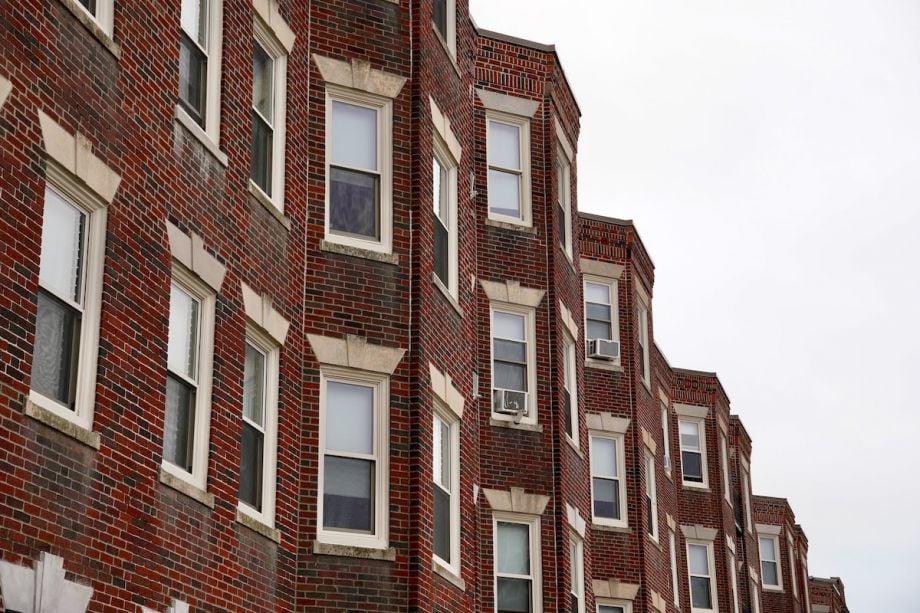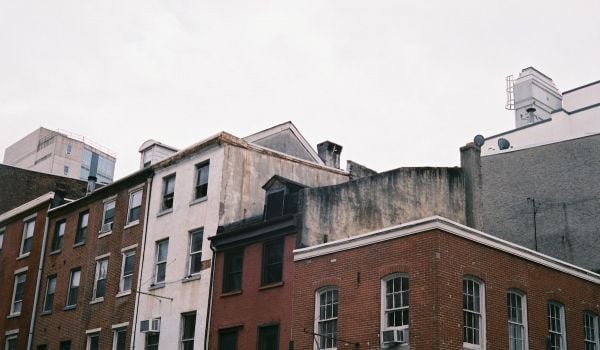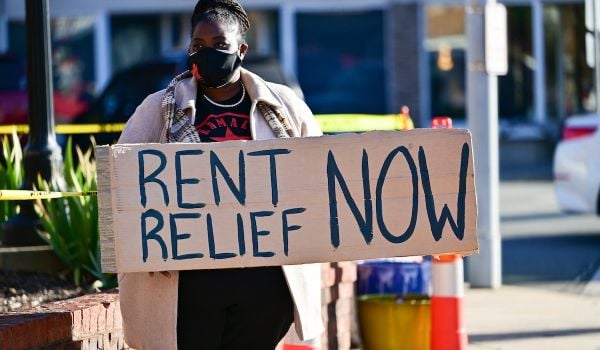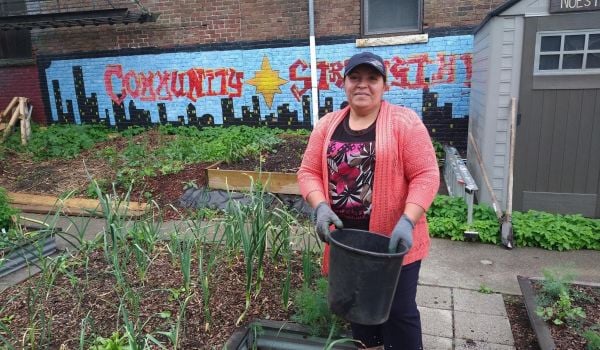Boston Mayor Michelle Wu and the city council celebrated an ambitious housing acquisition made in October. The city finalized a deal in October to buy 36 mostly three-story, multi-family buildings in the East Boston neighborhood for $47 million, forming the East Boston Neighborhood Trust to manage the properties with deed restrictions to keep all of the units affordable in perpetuity.
Residents of the buildings have experienced years of displacement after the apartments changed hands in 2014 and the new landlord issued every resident a “notice to quit,” a legal document letting residents know that eviction proceedings are forthcoming. While the units will now be permanently affordable for new tenants, nearly all the residents threatened with eviction eventually left the properties, save for one woman and her two children.
That tenant, Ana Ruth Ramirez, 48, remembers when she came home to her East Boston apartment in April 2015 and found the notice to quit on her door. Ramirez had lived in the building for 14 years and was worried when the property was sold. The new landlords, The Grossman Companies and Hodara Real Estate Group, were looking to evict all of the tenants before reselling the properties for a profit. Ramirez, who was going through a divorce at the time, was already worried about rent increases. The notice made her worry about where she and her two children would live.
“I didn’t know whether to scream, run, I was desperate and I didn’t know what was going to happen to my children,” Ramirez tells Next City through a Spanish language interpreter. Ramirez says that she showed the notice to her sister, who put her in touch with City Life/Vida Urbana, a Boston nonprofit that organizes working class immigrants. Ramirez was advised to keep paying her rent and fight the eviction, which she did for years, even as her neighbors left one by one.
Andres Del Castillo, an organizer with City Life/Vida Urbana, says the investor who purchased Ramirez’s property raised alarms from many in the community because of the speed and size of the purchases.
“Within…a few months worth of time, he bought up and purchased a significant amount of buildings and was doing building-wide clear outs,” Del Castillo recalls. City Life/Vida Urbana canvassed the neighborhood and found that many residents were getting notices to quit. Tenants cleared out, either not knowing they could fight the eviction or not having the energy.
“The common knowledge was your landlord asked you for your apartment, you just have to give it and so there was a lot of pressure for folks to do just that,” Del Castillo says. City Life eventually formed a tenant association with 10 of the units where residents decided to stay and fight. Eventually, they connected with the East Boston Community Development Corporation (EBCDC) to look into acquiring the properties to take them off the speculative market, an action the city was increasingly willing to take since it founded its Acquisition Opportunity Program.
After pressure, public demonstrations and media attention, Del Castillo says one of the investor’s backers expressed interest in selling the entire portfolio on the private market. EBCDC caught that the portfolio was going up for sale on the international market, a development that surprised them and residents. “I feel comfortable saying that is a first for this neighborhood,” Del Castillo says of the potential international sale. EBCDC floated the idea of intervening and purchasing the portfolio.
“Our local CDC knew about the history of this portfolio precisely because of the organizing that had happened around it,” Del Castillo says. “So they reached out to us as an organization and said, ‘Should we make an attempt to purchase these?’” At that point, nearly all the tenants had already been displaced, and the buildings were nearly empty.
“We still had one resident who had organized to fight her case, actively living in the portfolio. And so we were like, ‘Well, even if just for her, it’s worth it,’” Del Castillo says. Mayor Wu supported purchasing the buildings as well, as did two key council members, and a deal was announced in October, with a combination of federal and city funds, private backers and millions raised by City Life/Vida Urbana.
Ramirez says she was coming out of work when Del Castillo called to tell her the building would be purchased and put into a land trust. “I felt very happy,” she says. She’s been told that her rent, which is below market rate, might still have to go up, but believes it will be a smaller increase than it might have been with a private owner.
“I know that I’m going to have a rent increase, but it’s going to be something I can pay,” she says. She’s excited because she’s been told the land trust will handle repairs, which were not addressed by the past two landlords. The faucet in her bathroom is loose, the windows aren’t insulated properly, the bathtub has mold and the kitchen has no exhaust fan to suck up fumes from the stove.
“I have faith that little by little they’re going to fix it,” she says.
The city says the portfolio will be converted to a Mixed Income Neighborhood Trust, where units will be priced for a range of incomes, made affordable to people making 50% of average median income at the low end and 100% of average median income on the high end.
In addition to CARES Act and American Rescue Plan funding, the city invested money from its Acquisition Opportunity Program (AOP), which provides loans to affordable housing providers and nonprofits to acquire properties, provided they keep the units affordable for at least 50 years, with at least 40% of the units affordable to low- and moderate-income people. The program was created in 2016 in response to rapid speculation from investors.
After receiving $5 million of funding in 2019, the council used American Rescue Plan dollars to add $50 million of funding to the AOP between 2021 and 2022, making it among the more robustly funded housing acquisition programs of its kind in the country. It has since funded the acquisition of 113 buildings and 814 units of housing since 2016, according to a February presentation by the Mayor’s Office of Housing.
According to the city council, AOP generally funds about a third of the acquisition costs and the contribution typically maxes out at $100,000 per unit.
Del Castillo says that prior to the AOP, the price of land made it prohibitively expensive for CDCs and nonprofits to purchase housing stock and keep it affordable.
But the program helped members at Vida Urbana imagine a more long-term vision that wasn’t subject to the whims of landlords.
“We didn’t want our membership to just organize, fight for a new lease and in a year, be caught in the same situation. And that was what was actively happening to many, many, many of our members,” Del Castillo says.
The newly-formed neighborhood trust will be governed by a stewardship committee, of which City Life/Vida Urbana is a member. Del Castillo says the plan is to put out applications so that people who were displaced have an opportunity to move back into the buildings.
Ramirez is not sure if any of her neighbors will return; some moved to different cities or states. Some had money saved and were able to move to better apartments or buy property. But she says it’s possible some neighbors could return to other parts of the portfolio, if not in her building.
Del Castillo hopes the purchases presage an era of portfolio-wide acquisitions to curb speculation. “Hopefully, not a building at a time, hopefully clusters of buildings at a time so that we can grow at scale and really have a stronger intervention in the neighborhood,” he says. He says that investors have been reaching out to EBCDC about properties they own and are considering selling.
“I used to say in my prayers I would like my building one day be bought by City Life,” Ramirez says. While her building was not purchased by City Life/Vida Urbana, the nonprofit will be involved with the trust, so she feels her prayers were answered. “When I got the news I said thank you God, because you have heard a petition from my heart that I had, and it was always that my building would be part of the community.”
This article is part of Backyard, a newsletter exploring scalable solutions to make housing fairer, more affordable and more environmentally sustainable. Subscribe to our weekly Backyard newsletter.

Roshan Abraham is Next City's housing correspondent and a former Equitable Cities fellow. He is based in Queens. Follow him on Twitter at @roshantone.


















